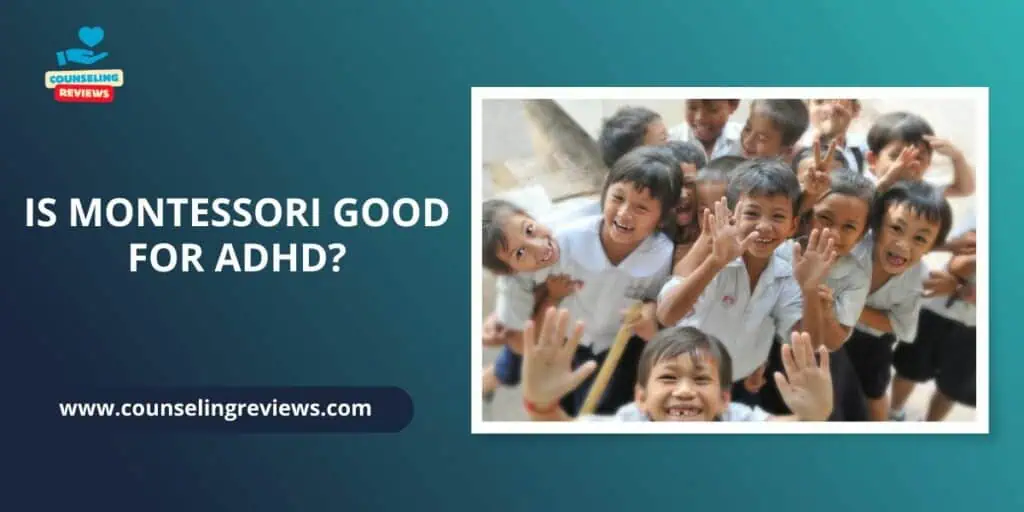When your child has ADHD, you want to ensure they have the best educational experience possible. As a parent, you’re probably exploring multiple options, trying to land on the best one.
Montessori school is one option that may come to mind for children with ADHD. Is this option suitable? We’ll explore the answer below.
Understanding Montessori and ADHD?
Montessori education is an approach to learning that was developed by Dr. Maria Montessori in the early 20th century. Her approach respects the developmental needs of young children up to age six.
Montessori programs operate according to the belief that children learn best when they are able to explore and interact with their environments. This exploration and interaction allows young children to direct their own learning and use their natural curiosity as they learn.
I’ve worked with several parents who are interested in the potential benefits of Montessori programs for their children with ADHD. After all, children with ADHD have a hard time with typical behaviors that are expected in the classroom. This includes attending to tasks, remaining seated, and waiting their turn before speaking.
Because of the way Montessori programs are run, children with ADHD may thrive in these environments. Given the opportunity to direct their own learning in a Montessori school, children with ADHD can choose learning activities that capture their attention.
How Montessori School Can Help a Child With ADHD
According to research, Montessori educational programs can help children with ADHD to develop attentional skills. These programs are beneficial for children with ADHD, because they allow children to choose activities that catch their interest.
When children are interested in their learning activities, they are able to concentrate better than if they are required to engage in teacher-determined activities. Over time, children develop their attentional skills by spending time engaged in activities that interest them.
Montessori school can therefore be a suitable alternative to traditional preschool programs that mostly require students to stay seated and complete teacher-provided activities.
Overview of Montessori Education
Before deciding whether Montessori education is the best choice for your child, I think it’s helpful to understand exactly what these programs entail.
Below are some key features of Montessori programs:
- Child-Centered Approach: Montessori education is centered around the child’s individual needs, interests, and abilities. Teachers observe each child closely and provide opportunities for them to learn and explore at their own pace.
- Prepared Environment: Montessori classrooms are carefully prepared environments designed to promote independence, exploration, and self-directed learning. They are equipped with a variety of hands-on materials and learning tools that children can manipulate and explore independently.
- Mixed-Age Classrooms: Montessori classrooms often have mixed-age groups, typically spanning a three-year age range. This allows children to learn from and with their peers.
- Freedom within Limits: While Montessori classrooms offer children a great deal of freedom and autonomy, this freedom is balanced by clear boundaries and expectations. Children are free to choose their activities and work independently, but they are also expected to follow classroom rules and respect the needs of others.
- Hands-On Learning: Montessori education emphasizes hands-on, experiential learning. Children learn through direct interaction with materials and activities that engage their senses and promote exploration, problem-solving, and critical thinking skills.
- Individualized Instruction: Montessori teachers tailor their instruction to meet the needs of individual students. They observe each child closely and provide personalized guidance and support to help them progress at their own pace.
- Emphasis on Practical Life Skills: Montessori education places a strong emphasis on practical life skills, such as cooking, cleaning, and self-care. These activities help children develop independence, concentration, and executive functioning skills.
- Respect for the Child: Montessori education is based on a deep respect for the child as a unique individual with innate potential. Teachers strive to create a nurturing, supportive environment where children feel valued, respected, and empowered to explore and learn.
What Montessori Has to Offer Kids With ADHD?
Above, you’ve learned about the basics of Montessori education. These features can directly benefit children with ADHD. I’ll talk more about this below.
Self-Paced and Self-Directed Learning
Children in a Montessori classroom are permitted to choose their own learning activities. This allows a child with ADHD to select something that captures their attention.
Developing Practical Life Skills
Montessori programs don’t just emphasize academic skills like counting and writing. They also teach practical life skills, which is essential for c children with ADHD. Learning how to clean and care for oneself can improve executive functioning in children with ADHD.
Self-Esteem and Maximizing Individual Potential
In my experience, children with ADHD tend to compare themselves to others, and their self-esteem may suffer when they feel they are not performing as well as their peers. Because Montessori programs allow children to choose their own learning activities, children can find something that interests them. This increases their chances of success, which can boost self-esteem in children with ADHD.
Distraction-Reduction
Montessori programs allow children the freedom to move about the classroom during learning times. Children are also permitted to choose their own learning activities. Many activities are hands-on, which is likely to capture the interest of children. All of these factors reduce the likelihood that a child with ADHD will become distracted.
Enhancing Social Skills and Peer Interaction
Mixed-aged Montessori classrooms promote peer interaction and collaboration. Teachers guide students toward resolving conflicts in a healthy way and working with others to learn. This promotes social skills development among children with ADHD.
Classrooms With Mixed Ages
Exposure to children of different ages is also beneficial for children with ADHD. Older children are likely to model behaviors like self-control, which can have a positive influence on children with ADHD.
The Concept of Isolating
Montessori programs isolate a single concept within learning materials, so children can focus just on that concept. This allows children to dive deeply into their learning, without being distracted by other things. For children with ADHD, this is essential, since they are prone to distraction.
Is Montessori Good for ADHD?
Whether Montessori is beneficial for a particular child with ADHD depends on that child’s needs. However, the features of Montessori programs make them a good fit for many children with ADHD. Freedom to move about the classroom and choose one’s own learning activities can make it easier for children with ADHD to focus.
FAQs
Below are some answers to commonly asked questions about Montessori and ADHD.
Is Montessori Suitable for ADHD?
Montessori programs have many features that are beneficial for children with ADHD. These programs allow children to move around the classroom and choose learning activities that interest them.
What Type of Child Does Best in Montessori?
Any child can benefit from Montessori education, but children with creative instincts are likely to find these programs especially rewarding.
What Is Not Allowed in Montessori?
Children in Montessori programs are expected to follow classroom rules. This means that damaging learning materials, disrupting the learning of others, showing disrespect, or using rough behavior in the classroom are not permitted.
What Age Is Too Late for Montessori?
Montessori programs are designed for children up to age 6.
Does Montessori Have a Downside?
Montessori programs provide hands-on learning, which can be beneficial for many young children. However, they may not provide the specific academic instruction necessary for success on standardized tests in the public school setting. Montessori programs can also vary in quality. Some teachers may not be as well-trained in the method as others.
Conclusion
If you have a child with ADHD, Montessori programs may be a good fit for them. These programs offer more freedom of movement, and children are permitted to choose their own learning activities. This can help them to engage more fully in learning, as compared to traditional preschool programs that involve teacher-chosen activities. I recommend exploring a Montessori program for your child with ADHD. The freedom in this setting may better meet their needs.
Sources:
- https://onlinelibrary.wiley.com/doi/full/10.1002/ets2.12252
- https://academicjournals.org/journal/ERR/article-full-text/EBB5CBC51414





